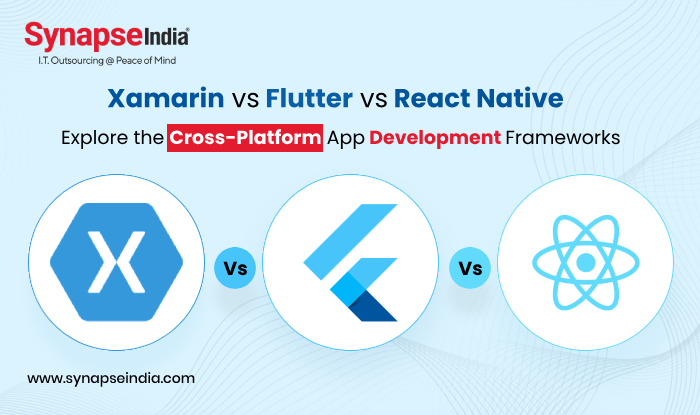 11 Jan 2024
11 Jan 2024
In the dynamic world of app development, the decision between Xamarian, Flutter, and React Native carries significant weight. These three cross-platform frameworks allow developers to create applications and ensure seamless operations on various devices. Cross-platform frameworks can run the code on different operating systems. Its mobile app development allows the user to work under a minimal budget and is ideal for start-ups. Now the confusion starts, where we have to choose one cross-platform framework for our next project. In this guide, we will explore three major frameworks of cross-platform mobile app development frameworks.
As you see it’s not difficult to understand the need for cross-platform development. Now let’s review the capabilities of the three best frameworks, Xamaria, Flutter, and React:

Xamarin mobile development has C# and native platform libraries which are wrapped in .NET layers. These .NET include three technologies Xamarin Platform, Xamarin Cloud, and Xamarin Insights. Out of these three, the Xamarin Platform is considered the most important element of Xamarin, which offers extensive controls of APIs, runtime engine, encryption, authentication, virtual machines, and many more. On the other hand, Xamarin Cloud provides an automated testing platform that ensures product quality on various devices. The last one, Xamarin Insight works as a monitoring tool that helps developers to track the application's crashes and exceptions.
Flutter is considered one of the best tools in cross-platform app development. It was developed by Google and supported by the same. Flutter uses the Dart language which includes the vast collection of native widgets. This helps the developers to create great and stunning cross-platform applications. Flutter includes Hot reload features that all developers to build applications instantly on web pages as well. Its full set of unique widgets implements material design for Android and offers Cupertino widgets for iOS.

React Native is an open-source mobile development framework that is widely used for cross-platform application development. Features of React allow developers to create iOS and Android applications using JavaScript with a handle of Native API components. The development of the React Natve app implements the imperative programming approach, where developers need to define a strict sequence of actions that help the user understand how the application is working while creating a user interface.
We already have all the information regarding the different cross-platform frameworks. Now let’s get a detailed comparison and differences between these three frameworks, and how Xamarin vs React Native and Xamarin vs Flutter are different from each other.
| Feature | Xamarin | Flutter | React Native |
|---|---|---|---|
| Language | C# | Dart | JavaScript (React) |
| Development | Microsoft Visual Studio | VS Code, Android Studio, IntelliJ | VS Code, Atom, Nuclide |
| UI Framework | Xamarin.Forms (Native) or Xamarin.iOS, Xamarin.Android (Native) | Flutter SDK (Native) | React (Native) |
| Performance | Near-native performance with Xamarin.Native, Xamarin.iOS, and Xamarin.Android | Excellent performance with native compilation | Near-native performance with bridge-to-native modules |
| Community Support | Large community support | Growing community support | Large and active community support |
| Integration with Native Features | Seamless integration with native APIs and features | Direct access to native features and APIs | Access to native modules through bridge |
| Hot Reload/Restart | Xamarin.Forms has a hot reload; Xamarin.Native requires rebuilding | Hot reload for UI, stateful hot restart for logic | Hot reload for UI, hot restart for logic |
| Customization | Xamarin.Native offers high customization; Xamarin.Forms provide some abstraction | Highly customizable; full control over every pixel | Customizable with native modules |
| Supported Platforms | iOS, Android, Windows, macOS | iOS, Android, Web, macOS, Windows | iOS, Android, Web |
Xamarin is often regarded as one of the best cross-platform app development frameworks that enables developers to create native-like applications for iOS, Android, and Windows using a single codebase. Xamarin's integration with Visual Studio, Microsoft's powerful development environment, enhances developer productivity. Moreover, Xamarin ensures near-native performance by compiling applications into native code, offering a seamless user experience. Ultimately, Xamarin's robust capabilities, streamlined development process, and support from Microsoft make it a top choice for businesses seeking efficient and high-quality cross-platform app development.
Choosing the right Xamarin app development agency is important for the success of your project. Here are key considerations to help you make an informed decision:
Evaluate the agency's experience with Xamarin development. Review their portfolio to see examples of Xamarin apps they have developed and assess their quality and functionality.
Look for client reviews and testimonials to gauge the agency's reputation and client satisfaction. This can provide insights into their communication, project management, and overall performance.
Examine case studies of previous Xamarin projects. This can give you a deeper understanding of the agency's problem-solving approach and its ability to address complex requirements.
Apart from Xamarin's expertise, consider the agency's proficiency in related technologies, such as backend development, databases, and third-party integrations, to ensure a comprehensive solution.
Inquire about post-launch support and maintenance services. A reliable agency should offer ongoing support to address any issues and ensure the app's continued success.
In the landscape of cross-platform app development frameworks, Xamarin, Flutter, and React Native stand out as the most crucial choice. While Flutter and React Native have gained popularity for their unique features, Xamarin's features and advantages make it a compelling choice for businesses. Xamarin mobile development and its integration with C# and the .NET ecosystem provide a familiar and powerful development environment. Ultimately, the choice among these frameworks depends on specific project requirements, developer expertise, and business objectives.

